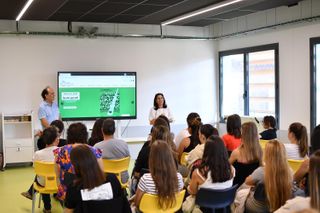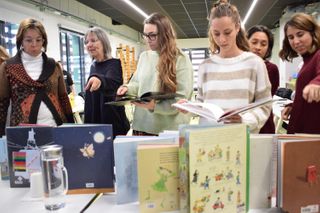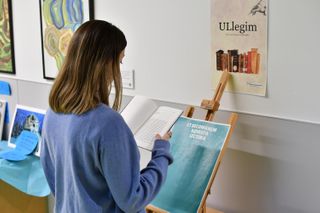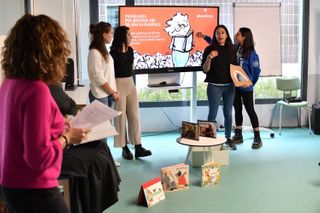- Education studies at the Faculty of Social Sciences at Manresa have made a determined commitment to boost the reading skills of future teachers through diverse, cross-cutting activities
- For the first time, students of the bachelor’s degree in Early Childhood Education at UManresa have participated in the Atrapallibres project, to accompany boys and girls in reading
- As part of actions to promote reading skills, UManresa gathered a hundred people in the Education Day on “The transformative power of reading: the value of children’s and youth literature”
The latest edition of the PISA report revealed worrying data on Catalan students’ skills in mathematics, science and reading comprehension. Reading is one of the weakest skills among Catalan students. This situation was highlighted by another study, the PIRLS, which found that Catalonia had the lowest levels of reading comprehension in the whole of Spain. The Faculty of Social Sciences of Manresa has a responsibility for training future teachers. Hence, it has made courageous decisions this year to help turn this situation around.
Reading is much more than decoding
"Reading competency is vital in any area of our society, but especially in the world of education,” stated Montserrat Pedreira, director of the bachelor’s degree in Early Childhood Education Teaching, who added that "understanding what you read means understanding, inferring, being critical, imaging, in short, it is much more than just decoding.” It is with this conviction that the bachelor’s degree in Early Childhood Education Teaching has promoted a whole series of actions to improve this much-needed skill “because as teachers, professionals with intellectual curiosity and a commitment to society, they must work on critical thinking and this requires reading skills. In addition, because it will be their responsibility, as future teachers, to ensure that all citizens enjoy the pleasure of understanding what they read, to promote reading as a source of knowledge throughout life.”
“Understanding what you read means understanding, inferring, being critical, imaging, in short, it is much more than just decoding”
The bachelor’s degree in Early Childhood Education Teaching has been working for years to improve the reading skills of future teachers and accompany them in the pleasure of reading. In the 2023-2024 academic year, this issue has been prioritized and put at the centre of the core competencies programme, whose aim is for students to get directly involved in the immediate environment, and contribute their knowledge for the benefit of society. The objective is for them to become aware, through practical experiences and direct involvement, that the function of education goes beyond the classroom and that their contribution can help to improve society. Therefore, this year, work on the Sustainable Development Goals (SDGs) and reading skills have been central to this programme, which gets students from the first, second and third years of the degree to work together.
The priority of putting reading and reading comprehension in a central position has resulted in a set of initiatives and activities that have been undertaken throughout the 2023-2024 academic year, most of which will continue in the future.
Atrapallibres and discovering the pleasure of reading
The most visible of all the actions was the direct participation of bachelors’ degree students in the Atrapallibres project. Their involvement took the form of accompanying and guiding boys and girls in reading books selected for an award promoted by the Catalan Council of Children’s and Youth Literature. The award is designed to encourage reading among children and young people of up/to/date, quality works in the Catalan language. Atrapallibres includes a selection of three books for each category (9, 10 and 11 years old) and the children form the jury that chooses the best work, according to their criteria. Sílvia Mas Sañé, vice-rector of the Manresa Campus of the UVic-UCC and coordinator of the Aloy Commission, said that “the experience of accompanying a child in reading for a few months has been extremely enriching and rewarding because it has made students aware of the transformative power of reading in children who discover the magic of literature, and has helped the students to develop a series of highly applied strategies and competencies that will be fundamental in their role as teachers.”

The students’ evaluations of this experience are similar. Paula Escalera Martín and Kai Suñol stated that participating in Atrapallibres “has given us the opportunity to get closer to children and create links between them and reading. This will be very good for us when we are teachers, because we will already have some practical experience in this aspect.” Laura Martín and Carla Cocera added that “the most gratifying moment was seeing how much the children really enjoyed reading each of the stories and how, as the stories progressed, the children got a little deeper into the world of reading. Through this project, we discovered the importance of reading from a young age and learnt that it is a tool to develop emotional connection, self-esteem, imagination and creativity, cognitive development and language.”
“Through Atrapallibres, we discovered the importance of reading from a young age and learnt that it is a tool to develop emotional connection, self-esteem, imagination and creativity, cognitive development and language”
Based on this first experience with Atrapallibres and considering its positive evaluation by those responsible for studies and students, it has been decided that the link between the bachelor’s degree in Early Childhood Education Teaching and the project will continue next year. The participation will be longer, with more accompanying sessions and evaluation with the students.
Learn to read different registers
As part of the development of future teachers’ reading skills, another action that has been initiated is the Academic Reading Circles. According to Sílvia Mas, this activity is part of the desire to make students learn to read different registers, from fiction to essays or academic articles. “It is essential that future teachers are very well trained in this area, not only because they will have to teach, but also because this contributes to their knowledge," she noted.
Directed by the lecturer Irene Tort, this activity uses a practical collaborative learning methodology. It consists of each student actively reading an academic article that they share with a group. Within the group, each person adopts a different role so that there are readings from different perspectives. In this way, an article can be read from the perspective of a moderator, with the intention of summarizing the document, from the role of asking questions or assuming the responsibility for choosing contextual elements of the text to explain and relate them. The work culminates in a 45-minute debate session during which everyone participates, with a focus on their corresponding role.
The importance of orality
According to the experts, orality plays a vital role in learning to read. That is why the bachelor’s degree training includes workshops on reading aloud, so that future teachers can master oral reading, to become good role models for children. A person who is not a good reading model "can hardly encourage boys and girls to read". This work was carried out in two sessions led by the expert Marta Luna. The first focused on the essential elements of reading aloud. In the second session, which was much more practical, students had to prepare a text to read in front of their classmates, following the teacher's recommendations.
A practical day for teachers and future teachers to encourage children to read
Orality was one of the highlights of the Education Day on “The transformative power of reading: the value of children's and youth literature” that was held at UManresa last March as part of various actions to promote reading. A hundred people participated, mostly teachers, but also teacher training students. In fact, the day was aimed at both groups, to reflect on children's and youth reading, and provide practical tools for application in the classroom.

Participants included the country's leading figures in children's and youth literature, such as Marta Luna, teacher and reading expert, and Maite Carranza, writer and screenwriter, who gave a talk entitled “Passion for reading is transmitted”. This talk was a real lesson in how to attract children to reading.
Reading is the basis of learning, but some schools want to go too fast to introduce it to children. Before getting there, we need to start with orality, which is what leads us to reading. It is important, they agreed, that children develop language through an environment where words flow, that they acquire the ability to listen and understand, and subsequently learn to speak and create linguistic structures. This is the path that leads children to gain an interest in reading and, eventually, in writing.
Reading is the basis of learning, but some schools want to go too fast to introduce it to children. Before getting there, we need to start with orality, which is what leads us to reading
Ways to encourage children to read
For children to be interested in reading, they must both fall in love with words and value books as objects. For children to value books, it is vital to ensure that they do not associate books with the work they are assigned at school but instead see them as desirable objects for pleasure, discovery and curiosity. All this requires committed teachers, who know how to spread enthusiasm for reading. In this aspect, it is essential to train teachers to become good models of reading, so that they know how to read and tell stories. This is the only way for schools to avoid just teaching the mechanics of reading, without considering the expression that gives meaning to the grammatical structures that children must learn to use when they read or write.
Another key aspect in the promotion of reading among children is the recommendation of books. For teachers and future teachers to be able to make good recommendations, they must read a lot. Only in this way, from this reading experience, will it be possible to ensure that the selection of works is appropriate for the age of the children and young people, so that they do not become frustrated by not understanding the text they are reading.
Other actions
Not all the actions carried out during the academic year had the same dimension as Atrapallibres, but in all cases they added to the objective of contributing to improving students’ relationship with reading, considering the role they will have to play in the future as promoters of reading. This is the case of the children's literary discussion workshop led by two expert teachers, Mariona Pujol and Maria Graell, who gave future teachers tools to work on conversation and dialogue in the classroom with children after a literary reading.
Another of the initiatives that will be continued was promoted by a group of students who have been working on a project to revitalise the pedagogical library of education studies. This initiative, framed in core competencies and related to the Sustainable Development Goal of “Quality education”, was implemented through ULlegim: a showcase in a visible place in the FUB4 building, next to the bookshelves. In this showcase, a work related to the world of education or of interest to teachers and future teachers is highlighted periodically, and reading it is recommended.

At the same time, those responsible for the studies actively participate and involve teacher training students in events and activities related to reading, such as the Tocats de Lletra festival or Poetry Day.
The advantage of the Josep Maria Aloy Children’s and Youth Literature Documentation Centre
Many of these activities take place at the Josep Maria Aloy Children’s and Youth Literature Documentation Centre, a space of great value to the Faculty's education studies. According to the vice-rector of the Campus and coordinator of the Documentation Centre, Sílvia Mas, having the centre means that "students have access to a unique documentary collection with more than 8,000 works of children's and youth literature in the Catalan language, in addition to archives and material for studies and research in this area.” In addition, she added “the Aloy Centre has become a stimulating space for cultural events related to the promotion of reading, such as book presentations, literary shows and debates, among others.” The Commission that manages the Aloy Centre is made up of people who are experts in reading and children's and youth literature “who are generators of ideas, projects and activities that have an impact on the Faculty’s education students and promote their training in this field.” For all these reasons, "the Centre is, without any doubt, a catalyst for the formation of our students’ reading competencies.”
The Josep Maria Aloy Children’s and Youth Literature Documentation Centre means that students have access to a unique documentary collection with more than 8,000 works of children's and youth literature in the Catalan language, in addition to archives and material for studies and research in this area

Reading in social science studies at UManresa
Reading is a core area of all the studies taught at the Faculty of Social Sciences at Manresa. In addition to the degree in Early Childhood Education Teaching, this area is worked on in the bachelor’s degree of Business Administration and Management and that of Management of the Digital Society. According to the Dean of the Faculty, Marc Bernadich, “reading is the basis on which we can build knowledge.” Reading and debating is part of students’ everyday life because reading and then reflecting on and discussing what we read encourages us to develop a critical spirit and is a different way of acquiring knowledge.